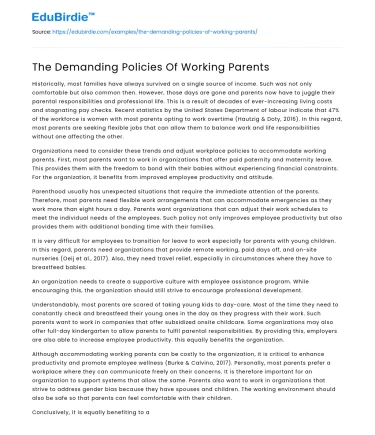Historically, most families have always survived on a single source of income. Such was not only comfortable but also common then. However, those days are gone and parents now have to juggle their parental responsibilities and professional life. This is a result of decades of ever-increasing living costs and stagnating pay checks. Recent statistics by the United States Department of labour indicate that 47% of the workforce is women with most parents opting to work overtime (Hautzig & Doty, 2016). In this regard, most parents are seeking flexible jobs that can allow them to balance work and life responsibilities without one affecting the other.
Organizations need to consider these trends and adjust workplace policies to accommodate working parents. First, most parents want to work in organizations that offer paid paternity and maternity leave. This provides them with the freedom to bond with their babies without experiencing financial constraints. For the organization, it benefits from improved employee productivity and attitude.
Save your time!
We can take care of your essay
- Proper editing and formatting
- Free revision, title page, and bibliography
- Flexible prices and money-back guarantee
Parenthood usually has unexpected situations that require the immediate attention of the parents. Therefore, most parents need flexible work arrangements that can accommodate emergencies as they work more than eight hours a day. Parents want organizations that can adjust their work schedules to meet the individual needs of the employees. Such policy not only improves employee productivity but also provides them with additional bonding time with their families.
It is very difficult for employees to transition for leave to work especially for parents with young children. In this regard, parents need organizations that provide remote working, paid days off, and on-site nurseries (Oeij et al., 2017). Also, they need travel relief, especially in circumstances where they have to breastfeed babies.
An organization needs to create a supportive culture with employee assistance program. While encouraging this, the organization should still strive to encourage professional development.
Understandably, most parents are scared of taking young kids to day-care. Most of the time they need to constantly check and breastfeed their young ones in the day as they progress with their work. Such parents want to work in companies that offer subsidized onsite childcare. Some organizations may also offer full-day kindergarten to allow parents to fulfil parental responsibilities. By providing this, employers are also able to increase employee productivity. this equally benefits the organization.
Although accommodating working parents can be costly to the organization, it is critical to enhance productivity and promote employee wellness (Burke & Calvino, 2017). Personally, most parents prefer a workplace where they can communicate freely on their concerns. It is therefore important for an organization to support systems that allow the same. Parents also want to work in organizations that strive to address gender bias because they have spouses and children. The working environment should also be safe so that parents can feel comfortable with their children.
Conclusively, it is equally benefiting to a parent and an organization to have policies that seek to ensure maximum work-life balance. With the globalization of the workforce, parents are under immense pressure to meet their parental responsibilities. Other policies that parents want to be implemented at the workplace include mentoring programs, lactation support, parental benefits, and leave support.
Organizations need to offer working parents flexible work schedules evaluate parental leave policies, implement ‘baby at work’ policies’, and encourage professional development in the light of all these 21st-century workplace pressures. Such measures allow organizations to compete for top talent in the global workspace.






 Stuck on your essay?
Stuck on your essay?

